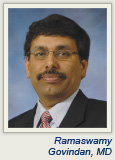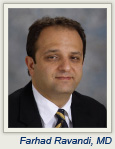August 15, 2011 (View All Issues)
A Landmark Lung Screening Trial: What Does It Mean for Clinicians and Their Patients?
The NCI-funded National Lung Screening Trial (NLST), published recently in The New England Journal of Medicine,1 was heralded as a landmark study in lung cancer detection. This study is the first comprehensive clinical trial to find that screening high-risk individuals with low-dose CT reduces lung ...
A Clinician Weighs In on the National Lung Screening Trial
 The results of the National Lung Screening Trial (NLST) will have important implications for practicing oncologists if low-dose helical CT screening is used routinely in the clinic.
The results of the National Lung Screening Trial (NLST) will have important implications for practicing oncologists if low-dose helical CT screening is used routinely in the clinic.
First, we will begin to find many more small tumors than we do now. This will pose new sets of questions for...
Acting on Fear
When I was first diagnosed with breast cancer in 1979 there was no global movement to raise awareness of the disease, there were no pink ribbon pins to show support, and there was no Internet with which to search for information. My doctor gave me the news on a Friday night, and the following...
Rising Costs of Cancer Care: It's More Than Drugs
All parties—the government, payers, and consumers—agree that, left unchecked, rising health-care costs will eventually hamstring vital portions of our delivery system. For example, Medicare, which covers more than 50% of the nation’s patients with cancer, is marching headlong toward insolvency....
Patients with Early Breast Cancer Benefit from Regional Nodal Irradiation
Findings from a Canadian study presented at the 2011 ASCO Annual Meeting may expand the pool of patients with lymph node–positive breast cancer offered extended-field irradiation.1
 “Results from MA.20 suggest that all women with node-positive disease following breast-conserving surgery be offered...
“Results from MA.20 suggest that all women with node-positive disease following breast-conserving surgery be offered...
Second Primary Malignancies Explored in Multiple Myeloma
Three randomized controlled trials presented at the 2010 Annual Meeting of the American Society of Hematology (ASH) suggested that treating multiple myeloma with lenalidomide (Revlimid) increased the risk of second primary malignancies; of particular concern is transformation to acute myeloid...
Bevacizumab Makes Inroads against Ovarian Cancer
Bevacizumab (Avastin) administered with chemotherapy and continued after chemotherapy improves outcomes in ovarian cancer, according to two multicenter, randomized, double-blind phase III investigations presented at the 2011 ASCO Annual Meeting. The first study, ICON7, incorporated bevacizumab as...
Intermittent or Continuous Androgen Suppression Produces Comparable Survival after Radical Therapy in Prostate Cancer
Men with prostate cancer who receive intermittent courses of androgen-suppressing therapy can live as long as those who are treated with continuous therapy, according to results of a recently concluded study. Until now, standard treatment has consisted of continuous therapy, but this is expected to ...
Sorafenib Acceptable in Child-Pugh B Patients with Hepatocellular Carcinoma
Patients with hepatocellular carcinoma and moderate liver dysfunction can derive benefit from, and be treated safely with, sorafenib (Nexavar), according to the second interim analysis of the GIDEON trial, presented at the 2011 ASCO Annual Meeting by Jorge A. Marrero, MD, of the University of...
FDA Issues Guidance for Diagnostic Tests Used with Targeted Therapies
 The FDA issued a new draft guidance to facilitate the development and review of “companion diagnostics”—tests used to help health-care professionals determine whether a patient with a particular disease or condition should receive a particular drug therapy or how much of the drug to give. The draft ...
The FDA issued a new draft guidance to facilitate the development and review of “companion diagnostics”—tests used to help health-care professionals determine whether a patient with a particular disease or condition should receive a particular drug therapy or how much of the drug to give. The draft ...
ODAC Recommends Accelerated Approval for Brentuximab
 Seattle Genetics, Inc, announced that the FDA’s Oncologic Drugs Advisory Committee (ODAC) voted 10-0 to recommend that the agency grant accelerated approval of brentuximab vedotin (ADCETRIS) for the treatment of patients with Hodgkin lymphoma who relapse after autologous stem cell transplant...
Seattle Genetics, Inc, announced that the FDA’s Oncologic Drugs Advisory Committee (ODAC) voted 10-0 to recommend that the agency grant accelerated approval of brentuximab vedotin (ADCETRIS) for the treatment of patients with Hodgkin lymphoma who relapse after autologous stem cell transplant...
ASCO’s International Cancer Corps Launches Initiatives in Ethiopia and Vietnam
Imagine just four oncologists attempting to provide care for a population of 82 million people living in a country covering twice the territory of Texas. That’s the state of cancer care in Ethiopia.
And imagine a country of more than 90 million people—more than twice the population of...
Oncology Community Briefs Members of Congress and Calls for Action
 ASCO and seven other oncology organizations held a Capitol Hill briefing in July and explained to nearly 200 members of Congress and their staffs how widespread cancer drug shortages are creating “a crisis in care.”
ASCO and seven other oncology organizations held a Capitol Hill briefing in July and explained to nearly 200 members of Congress and their staffs how widespread cancer drug shortages are creating “a crisis in care.”
According to the University of Utah Drug Information Service, the number of drug...
ASCO’s Oncology Slide Library Functions as a Share‑and‑Exchange Forum
ASCO’s Oncology Slide Library—which allows ASCO meeting attendees to upload and share their ASCO meeting presentation slides with slide-library subscribers—may only be a year old, but participation is already very high. This year’s Annual Meeting in June marked the first time ASCO gave each speaker ...
Help Your Patients Manage the Cost of Cancer Care
![]() Because the cost of cancer care can be high, it is important for your patients to understand what to expect before starting treatment so that they can manage the financial effect of cancer in the most effective way possible. To that end, Cancer.Net, ASCO’s patient information website, offers a...
Because the cost of cancer care can be high, it is important for your patients to understand what to expect before starting treatment so that they can manage the financial effect of cancer in the most effective way possible. To that end, Cancer.Net, ASCO’s patient information website, offers a...
New Safety Information Reported for 5-alpha Reductase Inhibitors
 The FDA announced that the Warnings and Precautions section of the labels for the 5-alpha reductase inhibitor class of drugs has been revised to include new safety information about the increased risk of being diagnosed with high-grade prostate cancer. This risk appears to be low, but health-care...
The FDA announced that the Warnings and Precautions section of the labels for the 5-alpha reductase inhibitor class of drugs has been revised to include new safety information about the increased risk of being diagnosed with high-grade prostate cancer. This risk appears to be low, but health-care...
FDA Outlines Oversight of Mobile Medical Applications
 The FDA is seeking input on its proposed oversight approach for mobile medical applications (“apps”) designed for use on smartphones and other mobile computing devices. This approach encourages the development of new apps, focuses only on a select group of applications, and will not regulate the...
The FDA is seeking input on its proposed oversight approach for mobile medical applications (“apps”) designed for use on smartphones and other mobile computing devices. This approach encourages the development of new apps, focuses only on a select group of applications, and will not regulate the...
Evaluating Risk for Suicide in People Diagnosed or Living with Cancer
The challenges of life-threatening physical illness can sometimes lead to suicide. In fact, given the critical stressors that a person with cancer faces, we might expect suicide to be a more common reaction. Patients with cancer are at increased risk of completed suicide, though the prevalence of...
Combined Therapy Produces Good Outcomes in Primary Testicular Diffuse Large B-cell Lymphoma
Final results of an international phase II trial of first-line treatment for primary testicular diffuse large B-cell lymphoma show that using a combined treatment strategy including chemotherapy and central nervous system and testicular prophlaxis “was associated with a good outcome.” The results...
Optimizing Treatment for Advanced Prostate Cancer Requires Shifting Focus from Individual Drugs to Integrated Therapies
Newer drugs, including sipuleucel-T (Provenge), cabazitaxel (Jevtana), and abiraterone (Zytiga), can extend survival modestly and ease symptoms for men with advanced prostate cancer. Maximizing the benefit to patients will require shifting the focus from developing individual drugs to developing...
A Conversation with Barrie R. Cassileth, PhD
 Barrie R. Cassileth, PhD, Chief, Integrative Medicine Service at Memorial Sloan-Kettering Cancer Center (MSKCC) in New York, recently spoke with The ASCO Post about her quest to stamp out the illegitimate use of alternative medicine in cancer care and the results from her latest research.
Barrie R. Cassileth, PhD, Chief, Integrative Medicine Service at Memorial Sloan-Kettering Cancer Center (MSKCC) in New York, recently spoke with The ASCO Post about her quest to stamp out the illegitimate use of alternative medicine in cancer care and the results from her latest research.
A...
Point of View: Should Patients Over 70 Receive Aggressive Therapy for Acute Myeloid Leukemia?
 Despite Advances, Little Overall Improvement Seen in Treatment of Older Adults with AML
Despite Advances, Little Overall Improvement Seen in Treatment of Older Adults with AML
By Charles A. Schiffer, MD
The outcome of treatment of older adults with acute myeloid leukemia (AML) remains unsatisfactory, although certainly not a totally futile exercise. Patients satisfying the entry...
Despite Advances, Little Overall Improvement Seen in Treatment of Older Adults with AML
 The outcome of treatment of older adults with acute myeloid leukemia (AML) remains unsatisfactory, although certainly not a totally futile exercise. Patients satisfying the entry criteria for cooperative group clinical trials can be expected to have complete remission rates of 50% to 55%, with...
The outcome of treatment of older adults with acute myeloid leukemia (AML) remains unsatisfactory, although certainly not a totally futile exercise. Patients satisfying the entry criteria for cooperative group clinical trials can be expected to have complete remission rates of 50% to 55%, with...
Conventional Induction Chemotherapy Beneficial in Only a Subset of Older Adults with AML

Over the past several decades, progress in the treatment of acute myeloid leukemia (AML) in the older population (generally considered to be older than 60 years) has been limited (Fig. 1). In particular, the outcome of patients over age 70 has been poor, with few long-term survivors. Although AML ...
Venous Thromboembolism More Frequent after Open Colorectal Surgery than Post-laparoscopy
The risk of developing venous thromboembolism (VTE) may be nearly twice as high for patients undergoing open colorectal procedures as for those undergoing laparoscopic colorectal resections, according to a report in the Archives of Surgery. The authors also “identified malignancy, obesity, and...
Endoscopic Excision May Be Viable Alternative to Surgical Resection of Large Colorectal Polyps
A retrospective review of 104 consecutive patients with large colorectal lesions, including 39 with carcinoma, found that “endoscopic excision of large colorectal polyps is a viable alternative to surgical resection in a select group of patients and can be performed safely with a good success...
Higher Risk of Recurrence for Triple-negative Breast Cancer after Modified Radical Mastectomy without Radiation
“The paucity of therapeutic options” for women with triple-negative breast cancer “emphasizes the urgent need to optimize the current locoregional management of patients with [triple-negative breast cancer] and reduce their risk of locoregional recurrence,” noted the authors of a Canadian study...
